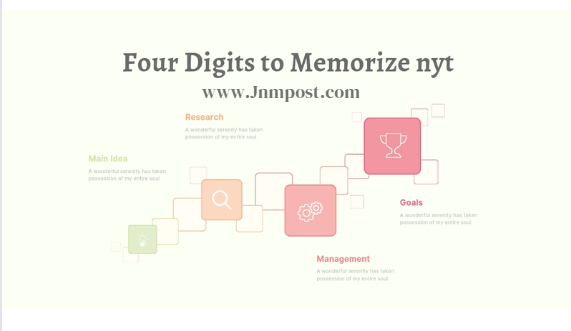Introduction
Memorization is a fundamental cognitive skill that plays a crucial role in our daily lives. Whether it’s remembering phone numbers, passwords, or important dates, the ability to efficiently memorize information is invaluable. This article delves into the intricacies of memorizing four digits, leveraging insights from the New York Times (NYT) to provide a comprehensive guide. By exploring various techniques and understanding the science behind memory, you can unlock the full potential of your mind.
The Science of Memorization
The human brain is a complex organ capable of processing and storing vast information. Memory can be categorized into short-term and long-term types. Short-term memory allows us to hold information temporarily, while long-term memory stores information indefinitely. Attention, repetition, and emotional connection significantly influence memory retention. Understanding these factors is key to mastering memorization techniques.
Historical Context of Memorization Techniques
Memorization techniques have evolved significantly over the centuries. Ancient civilizations like the Greeks and Romans developed methods such as the “method of loci,” which involves associating information with specific locations. Over time, these techniques have been refined and adapted, leading to modern strategies that incorporate both traditional and innovative approaches.
NYT Insights on Memorization
The New York Times has extensively researched memorization, uncovering valuable insights into effective techniques. Their findings highlight the importance of understanding how the brain processes information and the impact of various memorization strategies. These insights are the foundation for developing efficient and reliable methods to enhance memory.
Types of Memorization Techniques
Several techniques can be employed to improve memorization skills. Chunking involves breaking information into smaller, manageable pieces. Mnemonics use patterns and associations to aid memory. Visualization leverages mental imagery to reinforce information, while repetition solidifies it through continuous practice. Each technique offers unique benefits and can be tailored to individual preferences.
Understanding Four-Digit Memorization
Memorizing four digits may seem simple, but it is an excellent exercise for enhancing cognitive skills. The simplicity of four-digit sequences makes them ideal for practicing various memorization techniques. Applications in daily life include remembering PINs, security codes, and phone extensions. You can build a strong foundation for more complex memory tasks by mastering four-digit memorization.
Step-by-Step Guide to Memorizing Four Digits
- Step 1: Preparation
- Find a quiet and comfortable space free from distractions.
- Clear your mind and focus on the task at hand.
- Step 2: Visualization
- Create a vivid mental image of the four digits.
- Imagine the digits in a familiar setting or scenario.
- Step 3: Association
- Link the digits to something memorable, such as a significant event or a familiar object.
- Use creative associations to make the digits stand out.
- Step 4: Repetition
- Repeat the digits several times, both silently and aloud.
- Practice writing the digits down to reinforce memory.
- Step 5: Practice
- Regularly practice memorizing different four-digit sequences.
- Gradually increase the complexity of the sequences to challenge your memory.
Common Challenges and Solutions
Various challenges, such as mental blocks and distractions can hinder memorization. To overcome these obstacles, it’s essential to maintain a conducive environment and enhance concentration through mindfulness techniques. Regular breaks and healthy lifestyle choices can also significantly improve memory performance.
Tools and Resources for Effective Memorization
Several tools and resources are available to aid memorization. Apps like Lumosity and Memrise offer engaging exercises to boost memory. Books such as “Moonwalking with Einstein” by Joshua Foer provide in-depth insights into memory techniques. Online courses and workshops can also offer structured learning and personalized guidance.
Personal Stories and Case Studies
Real-life examples highlight the effectiveness of memorization techniques. For instance, memory champions who compete in international competitions often use advanced strategies to memorize vast amounts of information quickly. These stories serve as inspiration and provide practical lessons for enhancing memory.
Expert Insights on Memorization
Memory experts offer valuable advice on improving memory skills. According to neuroscientist Dr. Gary Small, incorporating physical exercise, mental challenges, and a balanced diet can significantly boost memory. Understanding the science behind memory and applying expert-recommended techniques can lead to substantial improvements.
Benefits of Improving Memorization Skills
Enhancing your memorization skills offers numerous benefits. Improved memory can lead to better academic and professional performance, increased productivity, and enhanced cognitive abilities. Additionally, maintaining a sharp memory can contribute to long-term brain health and reduce the risk of cognitive decline.
Latest Innovations in Memorization Techniques
Technological advancements have introduced new methods for improving memory. Neurofeedback devices, brain training apps, and virtual reality experiences offer innovative ways to enhance cognitive skills. Ongoing neuroscience research continues to uncover new strategies for memory enhancement.
Future Prospects of Memorization
The future of memorization techniques looks promising, with potential artificial intelligence and neuroscience developments. Emerging trends such as brain-computer interfaces and genetic research could revolutionize our understanding of memory and lead to groundbreaking methods for memory training.
Comparative Analysis of Memorization Techniques
Comparing traditional and modern memorization methods reveals their respective strengths and weaknesses. Traditional techniques like mnemonics and chunking are time-tested and effective, while modern methods leverage technology for personalized and engaging experiences. Understanding the pros and cons of each approach can help individuals choose the most suitable technique.
User Guides and Tutorials
Detailed user guides and tutorials can assist individuals in mastering various memorization techniques. Beginners can start with basic methods like repetition and visualization, while advanced learners can explore complex strategies such as the method of loci. Practical tips and step-by-step instructions ensure a smooth learning process.
Preventive Measures for Memory Decline
Preventing memory decline involves adopting a healthy lifestyle and engaging in cognitive activities. Regular physical exercise, a balanced diet rich in antioxidants, and mental challenges such as puzzles and reading can help maintain brain health. Additionally, staying socially active and managing stress is crucial for preventing cognitive decline.
Conclusion
Memorization is a powerful cognitive skill that can be enhanced through various techniques and strategies. By understanding the science behind memory and leveraging insights from experts, individuals can significantly improve their memorization abilities. Regular practice, a healthy lifestyle, and the use of innovative tools and resources are key to unlocking the full potential of your mind.






Be First to Comment